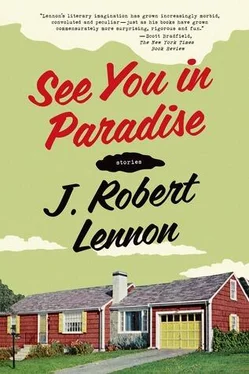Now there is a change in the noises around them. The knocking has stopped. Roy turns to the absence of the knocking and sees, illuminated by the light from inside, the wooden Buck Snort sign, attached at a single corner by a length of chain and twisting like a flag in the wind.
Roy remembers: being eleven years old, lying on the front porch swing of his parents’ house in southern Ontario, the lumpy and moldy-smelling cushion beneath him, All Creatures Great and Small in his hands, the summer heat like a blanket over him, making him feel cradled, held, fully embraced by the world. And the squeaking of the chains the swing hung from, deep groans really, as he twitched, invisibly, his muscles in the exact correct order and at the exact correct intervals to set the swing into pivoting, oscillating motion. And then the placing of the open paperback over his face, inhaling its essence from the gutter between pages, and falling asleep. This is what he is thinking of as he follows his wife down the steps and across the six feet of asphalt to the car and when he is struck with crushing force to the back of the head, just below the occipital protrusion, by the wooden Buck Snort sign, which the wind has freed at last.
Meanwhile, Fern has reached the car and wrestled open the door, which is trying to wrench itself out of her hands, and when she turns she sees something, something large and dark, launch itself from the vicinity of her husband’s head and wheel off into the darkness, and she watches her husband pitch forward and fall to the pavement on the other side of the car, and she sees that the bearded man is there, on the steps, his beard and clothes ripping in the wind like John Fucking Brown’s.
They are all soaked to the bone. They are all freezing. The raindrops hurt as they hit; it is like a rain of gravel. Bruce is trying to tell these people to come back inside, that they could die out here, but then the sign hits the man and he falls. Bruce looks up at the log frame; it is twisting and creaking now, one of the half-barrels lifts up off the ground, and suddenly the whole thing breaks apart and collapses on the pavement. He is trying to scream at the woman to go back, go back inside, but the words are ripped from his throat and carried away.
Bruce feels focused and competent for the first time in years. He needs to bring the customers back inside. He needs to pick up the fallen man and carry him into the Buck Snort and lay his unconscious body prone on a table and cover him with a tablecloth for warmth. This is an unambiguous good. He climbs down the steps. He makes his way to the driver’s side door where the man is lying on the pavement.
But Fern has abandoned the passenger door and moved to the back of the car and popped open the trunk with the key fob in her purse. The trunk lid flies up in the wind like a sail and the car bucks. Fern knows where to look. The tackle box. Unlatch it. Move aside the tray of hooks and lures and bobbers. Underneath, there is the knife. She has it. It’s in her hand. She peeks around the edge of the bucking, heaving trunk lid and sees the bearded man in motion. He is headed for Roy to finish him off. This is the moment. A snarl uncurls itself in her throat. Go. Go. Protect the husband. Kill the assailant. Your mother’s god won’t save him now. Do it.
Fern’s scream is too thin, too faint to be heard over the roar of the wind, the pounding of the rain, the creaking and flexing of the trunk lid. Only Heather sees the knife: she is standing at the window now, pressing herself against it, her palms white, flattened by the glass, like two captive sea creatures suctioned to an aquarium wall. That’s what they look like to Bruce when he glances up. The hands are white fish; the knife is a white flash in the gloom, a will-o’-the-wisp.
None of it seems real to Heather, no realer than anything outside the windows of the Buck Snort. She thinks, hit him in the mid-section, that’s the spot. You can’t kill the limbs, they grow back. Get the torso, the torso. And Bruce thinks, here comes something, what is it? He is three steps from the man, covers one more step against the mad wind, and the thing comes flying over the man’s body and part of itself lodges in his chest and Fern thinks, I’ve done it, I’ve protected him, and this is something no prayer could ever have the power to accomplish, no prayer can slip a knife between two ribs and pierce the heart, and Mother, I do not forgive you, not now or ever, forgiveness is for pussies, and I am glad you died without my absolution, and I will see you all in hell.
Carl Blunt was fully aware when he married her that Lurene was an unhappy woman, and he’d had no illusions about the possibility of her ever changing. She had told him as much when they met: “I’m not happy,” she’d said, on their second date, a dinner followed by a walk along the lake, “and I’m never going to be.” His response at the time had been a silent nod of understanding. Later she would tell him that this had clinched her conviction that he was the one; he was the only man she’d ever met who hadn’t tried to talk her out of it. He still hadn’t. His job was to acknowledge her unhappiness, accept it, and attempt, in ways that did not question her right to it, to comfort her in its throes.
Carl was a large man, over six feet and thick around the middle, and he liked being that way. He viewed his physical size as a single facet of a comprehensive personal identity, which also included among its primary features a quiet competence in all manner of practical tasks (filling the dishwasher, making things level, reading maps), an unerring mental fastidiousness, highly focused and slightly unorthodox artistic tastes, and a calm, friendly, unemphatic manner. He was attracted to Lurene because of her narrow hips, large breasts, wide face, stooped walk, and pessimistic worldview, and ten years of marriage had in no way diminished his attraction. If anything, she was more herself than ever, her hips thinner, face wider, breasts larger. She stooped no lower than before, but she gave the appearance of doing so, due to what years of unhappiness had done to her face. It was still pretty, hadn’t taken to wrinkling and sagging, but its flesh had taken on a grave heaviness that levity was powerless to penetrate. They had agreed when they married never to have children, and he was glad they had stuck to that promise, because it just would not have worked. They were too self-absorbed. They felt proud of themselves for knowing this.
Carl was thirty-three. Lurene was thirty-one.
There was one element in their lives that Carl hadn’t counted on when he married Lurene, a single wild card. That was politics. Lurene hated George W. Bush, utterly loathed him. This was 2005. She screamed, literally screamed, when she saw Bush’s face, which fortunately was not very often, because they had sworn off television news after the 2000 election, and because Carl got to the paper before she did each morning and was able to tear out any photos and throw them away. Lurene nevertheless often growled at the empty space Bush’s face had occupied.
Neither of them had ever been very politically aware, nor was anyone else they knew, back in the nineties. Carl could remember one or the other of them vaguely disapproving of something Clinton did now and then, and he could recall them both being very annoyed by the impeachment hearings of 1998. But nothing seemed of great consequence. They regarded the world as working more or less as it should, and concentrated on themselves, earning money, being married, and pursuing their various interests. They were content.
But Bush brought something out in Lurene that Carl hadn’t known existed. When the Supreme Court voted to stop the recount, Lurene picked up the transistor radio that Carl’s uncle had bought them as a wedding gift four years before, and she threw it against the kitchen wall, where it split in half, spilling electronic parts on the floor. After September 11, which Lurene blamed Bush for failing to prevent, and the invasion of Afghanistan, of which Lurene did not approve, such incidents became commonplace. She swept books off shelves, overturned chairs, and kicked a dent in the sheetrock wall of their apartment. She snarled at passing cars. When Bush invaded Iraq, she stopped having sex with Carl, and then only agreed to resume relations if she could crouch on her knees and press her raving face into the pillow. If he wanted it any other way, he had to catch her before sunrise, before she’d fully woken up, before the horrible world possessed her.
Читать дальше












